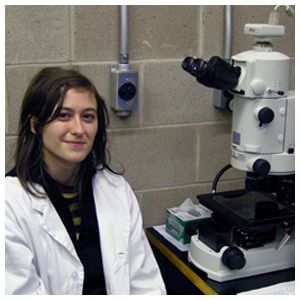Past Lab Members
2007
From left to right: Megan Best, Kabir Bhanot, Dr.Arunika Gunawardena, Chris LeFort, Anna Elliott

Mom's Lab
By Anisha Rajaselvam
Megan Best

In addition to her calcium work, Megan had initiated another set of experiments to attempt fluorescent protein transformation of lace plant cells using Agrobacterium, with the ultimate intent of targeting the nucleus and tonoplast to study the activities of these organelles during PCD.
Kabir Bhanot

Programmed cell death (PCD) is the regulated death of a cell in a multicellular organism. PCD is genetically encoded and it usually confers an advantage in development and growth. Two broad categories of PCD exist: developmentally regulated and environmentally induced. Aponogeton madagascariensis, commonly known as the Lace Plant, is a good model to study developmentally regulated PCD in plants. Each leaf contains transverse and longitudinal veins which isolate many repeating units. PCD occurs in the center of these units but stops four to five cell layers from the perimeter formed by the veins. This creates perforations across the surface of the entire leaf (see Lace Plant). The control cells are located between the veins and the cells that undergo PCD. I will attempt to isolate cells from the control areas employing previously formulated cell isolation protocols and induce PCD in them. The environmental induction of PCD in cells that do not normally undergo PCD will be studied and compared to analogous process in cells which experience developmental PCD.
I completed the first year of my biology BSc at Saint Mary's University and the second at Dalhousie. Kabir received an NSERC undergraduate student research award for the summer of 2007.
Lab Members
Past Lab Members
